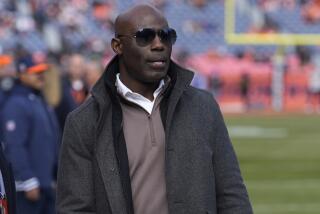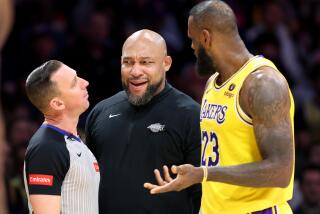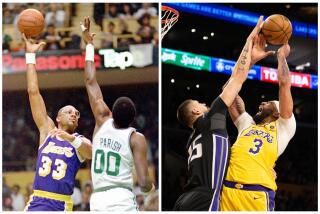Eric Davis, Caught in Spotlight, Is Feeling the Heat : National League: Reds’ outfielder is feared by opponents yet booed by fans in Cincinnati.
CINCINNATI — He is the most influential player for the Cincinnati Reds in this National League championship series, yet he cannot run without pain.
Every day, with every step, he feels it in his right knee.
“Always,” Eric Davis said softly. “It hurts every minute.”
He is the most influential player, yet he cannot take a full cut at a pitch without pain. His shoulder is so badly bruised from a late-season collision with an outfield wall that his swings have become the tired jabs of a weary boxer.
“I’ve given up trying to pull the ball. I can’t do it,” said Davis, who has pulled only three balls to the left side of the field in 20 plate appearances. “I’m just trying to get my bat on it.”
He is the most influential player even though he is hitting .158 in the playoffs, the lowest of any regular. He has one extra-base hit. He has driven in one run.
But he remains the most influential player because, simply by being Eric Davis, he inspires fear, resentment and respect.
When he takes to Riverfront Stadium field tonight for Game 6 against the Pittsburgh Pirates, his team a victory away from the World Series, there will be one example of his influence.
He will be booed. His teammates guarantee it. “It’s funny that nowhere in the league do the fans hate Eric as much as they hate him here,” Red pitcher Norm Charlton said. “Everything he does, they boo. They don’t give him any breaks. Not one.”
And when Davis, the Reds’ No. 4 hitter, is in the on-deck circle, there will be another example. The Pirates’ pitcher will be throwing balls around the middle of the plate to the Reds’ No. 3 hitter. Pitchers are afraid of walking the No. 3 Cincinnati hitter, putting a runner on base for Davis.
This fear has backfired. The batting average of the Reds’ No. 3 hitter, a position held by four different players thus far, is .429. One of those No. 3 hitters has been Paul O’Neill, a top candidate for the series’ most valuable player award with a .467 average with one homer and four RBIs.
“Other clubs worry so much about Eric, they forget about the rest of our guys,” teammate Glenn Braggs said. “It goes back to the Rickey Henderson theory in Oakland.”
Finally, Davis’ teammates will provide a third example. Even though he can barely run or hit, they know that when they need him, he will be there.
The reason Billy Hatcher chased that fly ball by Pittsburgh’s Bobby Bonilla to the center-field wall in the eighth inning of Game 4? He knew that if he crashed into the wall and missed the ball, Davis would be backing him up.
Sure enough, he hit the wall, but Davis was there to pick up the ball and throw Bonilla out at third base in what has been the outstanding play of the series.
Davis struggled through most of the season after suffering a knee injury April 24 that will require off-season arthroscopic surgery. He was batting .224 on Aug. 19.
But his teammates remember how, during the Reds’ stretch drive from Aug. 22 to Sept. 27, he hit .357 with nine homers and 29 RBIs.
“Eric’s influence on this club is so great, you can’t describe it,” said Braggs, who compared him to a former teammate at Milwaukee. “I liken him to Robin Yount. You know that day in and day out, he’s going to be there.”
Davis, a former star at Fremont High in Los Angeles, enjoys this spotlight. But he hates it, too.
Last winter he signed a three-year, $9.3-million deal with the Reds, even though he could have become a free agent this winter, partially because he likes his niche on the team. He even bought a home in the area.
But he is not in love with Cincinnati fans. In an important game with Houston late in the season, he was booed in three consecutive at-bats. He responded with a three-run homer in his fourth at-bat that drew a standing ovation and demand for a curtain call.
But he would not leave the dugout.
“If you have any pride in yourself, getting booed hurts,” Davis said. “They pay their money, they can say whatever they want. But man, I’ve even been booed when I get a base hit! People put you so high on a pedestal, you can’t make a mistake. And that’s unfair.”
Said Manager Lou Piniella: “People expect Eric to do everything. He makes it look too easy.”
Maybe it used to be easy. Davis averaged 31 homers, 91 RBIs and 47 stolen bases in each of his four big league seasons before this one. He won three consecutive Gold Gloves in center field.
But this year, with his knee problems, he decided to cut back on his running--he stole only 21 bases. He also cut back on his swing and his home run total fell to 24. And to save his legs, he has been moved to left field, where he has not been as comfortable.
Throw in a couple of cortisone shots in the knee and nightly bags of ice on his shoulder and Davis has realized that all-star outfielders are also human.
Now, he only wishes everyone else would realize it.
“If I was great every time, like everybody expects, there wouldn’t be enough money in the world to pay me,” he said. “Nobody is great every time. Everybody is forgetting a funny little thing about this game--there is always somebody pitching a ball and trying to get you out. Why is it that the majority of people who see you strike out think that you’re not trying?”
The most influential player rubbed his knee as if trying to decide whether his influence was a blessing or a curse.
“Why can’t people realize that I give 110% and keep my mouth shut and that’s all I can do?” he asked.
More to Read
Go beyond the scoreboard
Get the latest on L.A.'s teams in the daily Sports Report newsletter.
You may occasionally receive promotional content from the Los Angeles Times.











